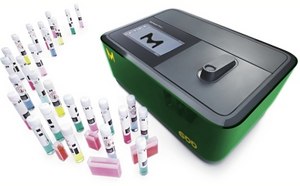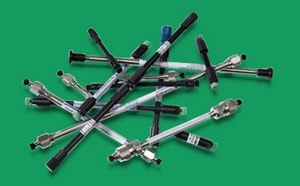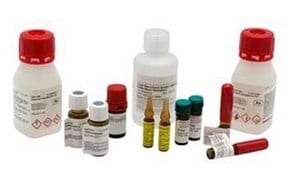Wastewater & Process Water Testing

Treatment of wastewater and process water is necessary to protect public health and the environment, as well as to maintain industrial process efficiency. Regular analytical testing of wastewater effluents at various treatment steps is required by most regulatory bodies. The chemical content of process water used in boiler and cooler systems is also typically analyzed.
Featured Categories
Explore Spectroquant® solutions: instruments, software, test kits, accessories. From start to finish, ensure rapid, accurate results with user-friendly handling.
Achieve precise separations with our extensive HPLC column collection. Enhance retention, resolution, and selectivity. Order today.
Certified Reference Materials: CRMs for forensic, clinical, environmental, pharmaceutical, and food & beverage testing.
Achieve superior GC performance with our columns, consumables, and accessories. Explore Supelco® offerings.
Wastewater Treatment and Analysis
To protect the environment and communities, almost all governments require the treatment and testing of municipal wastewater from households and industrial wastewater from chemical, pharmaceutical, food, beverage, and other production facilities. There are four main treatment steps in the wastewater treatment process. The preliminary treatment removes all large and settleable solids from the wastewater. Secondary treatments use accelerated microbiological growth to remove organic pollutants.
The tertiary treatment utilizes a combination of chemical and biological processes to reduce nutrient loading in the wastewater. The quaternary treatment removes particularly difficult emergent pollutants, like pharmaceutical compounds or other complex molecules. Analytical testing at each step is required to monitor key chemical parameters like nitrogen compounds, phosphates, and chlorine.
Process and Cooling Water Testing
Analyzing cooling and boiler water is essential for power plants and industrial producers such as chemical, pharmaceutical, technical, or food and beverage companies. Monitoring silicate, calcium, and magnesium content is imperative as they form scale deposits, leading to higher maintenance costs and downtime. Additionally, iron content is also monitored as an indicator of system corrosion. Typically, a demineralizing step is performed by passing the input source water through a clarifier before entering the feedwater tank. The water is further conditioned and sent to the boiler or cooler loop to drive turbines or other activities.
Wastewater and Process Water Testing Technologies
Regulatory agencies, like the U.S. Environmental Protection Agency (USEPA), require the use of official methods when testing drinking water (Safe Drinking Water Act) and wastewater (Clean Water Act). These methods require microbiological testing by culture or molecular techniques, and chemical testing by spectrophotometry, pH, conductivity, and turbidity analysis. Higher sensitivity methods that analyze trace pollutants in water, wastewater, or acid-soluble solids rely on low ppb level detection via either ICP-MS or ICP-AES.
Visit our document search for data sheets, certificates and technical documentation.
Related Articles
- We are a global leader in the life science industry and have produced test kits to measure numerous analytes. Water Online spoke with us about advances in measuring chemical oxygen demand.
- Mesoporous silica used in wastewater remediation, air cleaning, catalysis, bio-catalysis, and drug delivery.
- Total Nitrogen Analysis kit offers a fast, accurate, and cost-effective method for water and wastewater testing.
- Urea in water and wastewater, enzymatic determination - Photometric determination using the indophenol blue method after cleavage of the urea
- Step-by-step accurate reflectometric determination of ammonium in wastewater with Nessler’s reagent or Indophenol blue using Reflectroquant®system and test strips.
- See All (30)
Related Protocols
- The Millipore® Patch Test Kit is a portable kit for the collection and testing of hydraulic fluids, bulk chemicals, boiler water, and lubricating oils. The kit includes consumables for 100 tests.
- Triclosan was detected in waste water plant discharge using HPLC followed by UV and MS/MS detection.
- Rapid and sensitive test for silicate-induced scale deposits ensures industrial plant efficiency and sustainability.
- Quantify selenium in water using this photometric test and a clear, filtered sample to measure the results at 445 nm.
- Step-by-step method describing the photometric determination of ammonium ions in effluents using Spectroquant® test kits and spectrophotometer.
- See All (12)
Find More Articles and Protocols
How Can We Help
In case of any questions, please submit a customer support request
or talk to our customer service team:
Email custserv@sial.com
or call +1 (800) 244-1173
Additional Support
- Chromatogram Search
Use the Chromatogram Search to identify unknown compounds in your sample.
- Calculators & Apps
Web Toolbox - science research tools and resources for analytical chemistry, life science, chemical synthesis and materials science.
- Customer Support Request
Customer support including help with orders, products, accounts, and website technical issues.
- FAQ
Explore our Frequently Asked Questions for answers to commonly asked questions about our products and services.
To continue reading please sign in or create an account.
Don't Have An Account?



